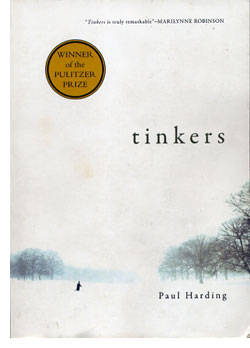 |
 Paul Harding
Paul Harding
Tinkers
Bellvue Literary Press
US Trade Paperback 7th Reprint Edition
ISBN 978-1-934-13712-3
Publication Date: 01-01-2009
192 Pages; $14.95
Date Reviewed: 10-19-2013
Reviewed by: Rick Kleffel © 2013
Index:
General Fiction
Fantasy
George Crosby is dying and hallucinating as 'Tinkers' opens. He has eight days left, and in 192 pages, Paul Harding ranges far and wide even as he never nominally leaves the mind of the man dying on page 1. If the awards and acclaim accorded to 'Tinkers' didn't convince you to read it the first time around, then it is time you took yourself to the local bookstore, picked up a copy and read the first page or so. 'Tinkers' is all about the prose, the string of sentences that runs from cover to cover. Harding has created a universe of words in which he immerses his readers.
Make no mistake, 'Tinkers' will require and reward the focus and concentration you bring to bear as a reader. This is a book that understands the pleasures in reading are directly proportional to the amount of work that the writer can inspire the reader to perform. Even though the length might put it in the range of the novella, the density of the prose ensures that 'Tinkers' reads like and feels like a very rich novel.
Here you will find pages without paragraphs and sentences that twist and turn, circling in on themselves and the swooping out for a bigger picture. Harding slips from an internal perception to an external event to a memory with the ease of a snowflake, drifting to earth. Images bubble up and slip into actuality. Dialogue is rare and there are excerpts from a fictional work on fixing clocks, as might have been written by Milton, had he been a clockmaker. 'Tinkers' may be difficult reading, but Harding is a master at crafting narrative tension with prose only, prose that is ever tantalizingly just out of reach.
Harding offers readers most of the plot in the first page. George Crosby is dying, he's got eight days. Eight days of memory, of incident in mind, gives Harding quite a lot of opportunity to roam, and he does so in a manner that turns 'Tinkers' into as effective historical novel of deep time, and a paean to nature, as transcribed by the writer transcribing the thoughts of George Crosby. If that sounds a bit convoluted, it is, but gorgeously so. Harding writes the kind of prose that makes the world go away.
We meet, we become George, his father, his father's father, we pull a wagon through the woods and harbor a volume signed by Nathaniel Hawthorne. A second life, after an escape from the eastern wilderness. Epilepsy and seizures, or are they jolts from the universe that surrounds George, as his world, his mind collapses. 'Tinkers' is best read in one sitting or two, preferably in a natural setting. It's a short book, and if you can achieve the proper immersion, Harding's prose will become as memory to you, as dream to you.
The 'Tinkers' of the title are the men who pull the carts through the woods, fixing this and that; George Crosby in his later years, fixing a clock. But Harding himself is a tinker, a man who modulates your mind and your world with mere language. Read 'Tinkers,' make the effort, and you will understand that Paul Harding knows that words are the best way to fix this world.
|
 |




